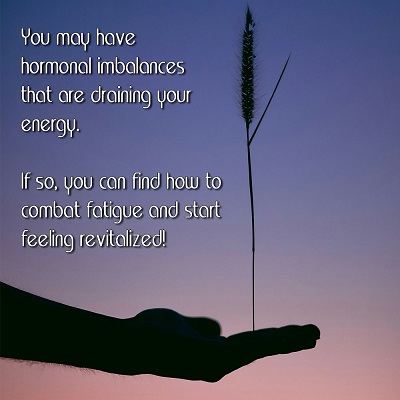 If you are feeling tired all the time it may be that your hormones are out of balance. Fatigue is one of the most common symptoms of a hormonal imbalance, however, it’s essential to consider other potential causes as well and seek appropriate medical evaluation and treatment if fatigue persists. In other words, don’t self-diagnose!
If you are feeling tired all the time it may be that your hormones are out of balance. Fatigue is one of the most common symptoms of a hormonal imbalance, however, it’s essential to consider other potential causes as well and seek appropriate medical evaluation and treatment if fatigue persists. In other words, don’t self-diagnose!
Here are some of the hormones, that if are showing an imbalance, may be causing your tiredness.
Thyroid Hormones – Regulating Your Metabolism and Energy
We’ve listed this one first because it is certainly a common one, especially for women. The thyroid gland produces hormones that regulate metabolism and energy production. If the thyroid is underactive, which is known as hypothyroidism, it can cause your metabolism to slow down and tiredness to set in.
If the thyroid gland is overactive, which is known as hyperthyroidism, it can also cause fatigue! This may seem counterintuitive since hyperthyroidism is often associated with symptoms like increased energy levels or nervousness, but fatigue can still occur.
Cortisol – Your Stress Hormone
Cortisol is produced by the adrenal glands in response to stress. When you’re constantly exposed to stress, it throws your hormone levels off balance because it produces cortisol persistently. Our bodies can manage elevated cortisol for short periods, but without respite, these levels cause many problems including fatigue.
To stop feeling tired all the time, learn how to manage your stress levels better and keep this hormone in check!
Insulin – Regulating Your Blood Sugar Levels
If your insulin levels are too high, it can cause you to feel fatigued. Insulin plays a crucial role in transporting glucose into your cells to meet your energy demands. If you have reduced insulin production, it can result in feelings of tiredness. Insulin resistance, where the body’s cells do not respond to insulin as they should, gives the same result.
Insulin resistance is strongly correlated with type 2 diabetes or being prediabetic and is becoming increasingly common. Make sure you get your blood sugar levels checked regularly, as persistent fatigue can also be a sign of type 2 diabetes. As insulin plays a crucial role in managing your blood sugar levels, any irregularities in its production or function can indicate potential health issues.
Estrogen, Progesterone and Testosterone – The Sex Hormones
While these hormones are essential for various bodily functions, imbalances can occur, leading to a range of symptoms, including fatigue. Fluctuations in estrogen and progesterone levels during menstrual cycles, perimenopause, and menopause can disrupt sleep patterns, energy levels, and mood, contributing to fatigue in women.
Similarly, low levels of testosterone in both men and women can result in decreased energy levels and vitality, leading to fatigue. Hormonal imbalances affecting all these hormones can disrupt the balance necessary for optimal physiological functioning, highlighting the relationship between hormonal health and fatigue.
Hormonal Imbalances and Lifestyle Changes
If you know, because you have been diagnosed by your health care professional, that your fatigue is due to hormonal imbalances in your body, there are several lifestyle changes you can make to help improve any imbalance.
- Get Enough Sleep – Aim to get at least 7-8 hours of sleep per night, which will help regulate your hormones and improve your energy levels.
- Stay Hydrated – Dehydration can contribute to fatigue, so make sure to drink plenty of water throughout the day.
- Exercise Regularly – Regular exercise can help regulate hormone levels, reduce stress, and boost energy.
- Eat a Balanced Diet – Your body needs essential nutrients to support hormone balance and energy production. Make sure your diet is a healthy one so that you don’t get blood sugar spikes either!
- Manage Stress – This is so important. Don’t skip this essential lifestyle behavior. Your health will improve in so many ways. You won’t just stop feeling fatigued, you will feel alive and happier.
Final Thoughts
Hormonal imbalances can have a significant impact on fatigue because they play a crucial role in regulating your energy levels and stamina. By making lifestyle changes as mentioned above, you can improve the balance of your hormones unbelievably!
Hormonal imbalances are complex, so if you do feel tired all the time, please make sure you get them checked. Your tiredness may involve multiple hormones or systems in the body, which could be affecting other areas of your health. That’s why it’s important to consult your doctor to determine if there is a problem and what you can do to correct it.






